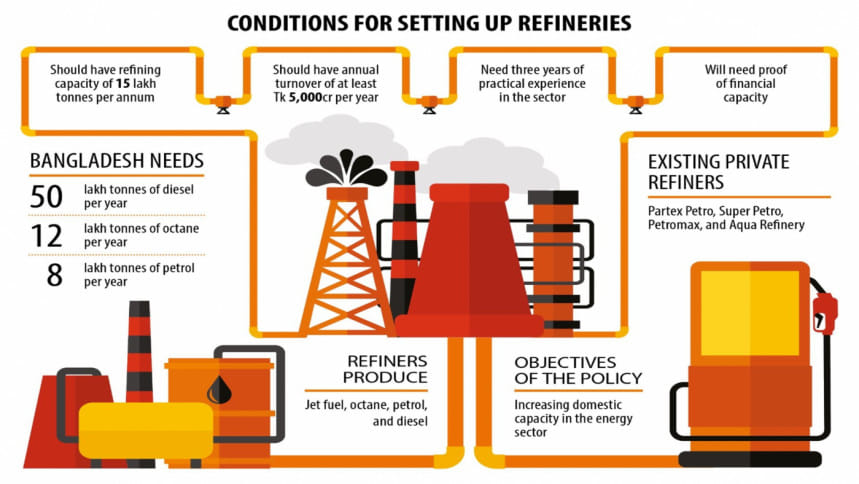Oil refiners concerned over new policy

The policy for setting up and operating private refineries will pose difficulties for existing refiners as a provision makes it mandatory to build up capacity for production of petroleum products to 15 lakh tonnes per annum, according to industry insiders.
In order to meet growing demand for fossil fuels in the country, the government formulated a policy allowing the private sector to set up refineries to process crude oil and market products for the first time.
The Ministry of Power, Energy and Mineral Resources issued a gazette notification on the "Establishment of Refineries at Private Level, Storage, Processing, Transportation and Marketing of Crude Oil Imported Policy-2023" on November 20.
This policy will be applicable for the setting up and processing of refineries in the private sector, and marketing of related products.
It aims to increase domestic capacity in the energy sector using modern technology and generate employment.
However, industry insiders said financial pressure would be exerted on existing private refiners as the policy made it mandatory to build up their production capacity to 15 lakh tonnes per year.
According to statistics on petroleum product sales in Bangladesh, since FY18 to FY22, sales of jet fuel grew at over 6 percent, octane at 5.72 percent, petrol at 6.6 percent, diesel at 70.15 percent, kerosene at 1.25 percent, and furnace oil at 8.7 percent.
As per the policy, private entrepreneurial organisations with a minimum of three years of practical experience in supply and plant management in the energy sector will get permission for production and marketing of energy products.
Private entrepreneurial organisations interested in setting up a refinery must have had an annual turnover of at least Tk 5,000 crores or equivalent in US dollars in any three of the past five years.
Besides, in the case of financing construction of related infrastructure, including refineries of private entrepreneurs, proof of financial capacity must be submitted from time to time.
In setting up and operating the plant, private entrepreneurial organisations must comply with internationally recognised safety standards and environmental compliance, it said.
According to the policy, private entrepreneurs have to pay a non-refundable fee of Tk 1 crore to the Bangladesh Petroleum Corporation (BPC) when they apply to set up such initiatives.
Subir Kumar Ghose, chief executive officer of Partex Petro, said the policy was unfavourable for the private sector as it would create financing pressure.
"The policy made it mandatory to ensure an annual production capacity of 15 lakh tonnes of fuel, including diesel, petrol and octane, which will be expensive and requires huge investment," he said, adding that there was no guarantee that the BPC would purchase all the oil produced.
According to Ghose, it will take an investment of around 12,000 crore to set up an oil refinery given the current price of US dollars.
There are currently four private refiners in the country -- Partex Petro, Super Petrochemical, Petromax LPG, and Aqua Refinery.
He added that Bangladesh requires 50 lakh tonnes of diesel, 12 lakh tonnes of octane, and eight lakh tonnes of petrol annually.
The government produces 80 percent of the required diesel from its own refinery while sourcing the rest from the private sector, he said.
Ghose added that the government would need to hand over marketing duties to the private sector. Otherwise, the investment will not be business viable.
On the other hand, there is confusion about how much the demand for fossil fuels will be impacted within the next 6-7 years, especially given the increasing use of electric vehicles.
Hasan Imam Siddiki, financial adviser of Youth Group and head of the refinery unit of Petromax Refinery Ltd, questioned how the government would control quality if it depended on private refineries.
According to him, the private sector can currently cater to around 80 percent of octane and petrol demand with strict quality control, but can meet only around 10 percent of the demand for diesel.
He opined that the government should not rely on any particular group regarding the energy sector.
Siddiki also said the policy would not be favourable for existing refineries as they have to upgrade their capacity, which is a matter of huge investment and may lead to quality issues.

 For all latest news, follow The Daily Star's Google News channel.
For all latest news, follow The Daily Star's Google News channel. 



Comments